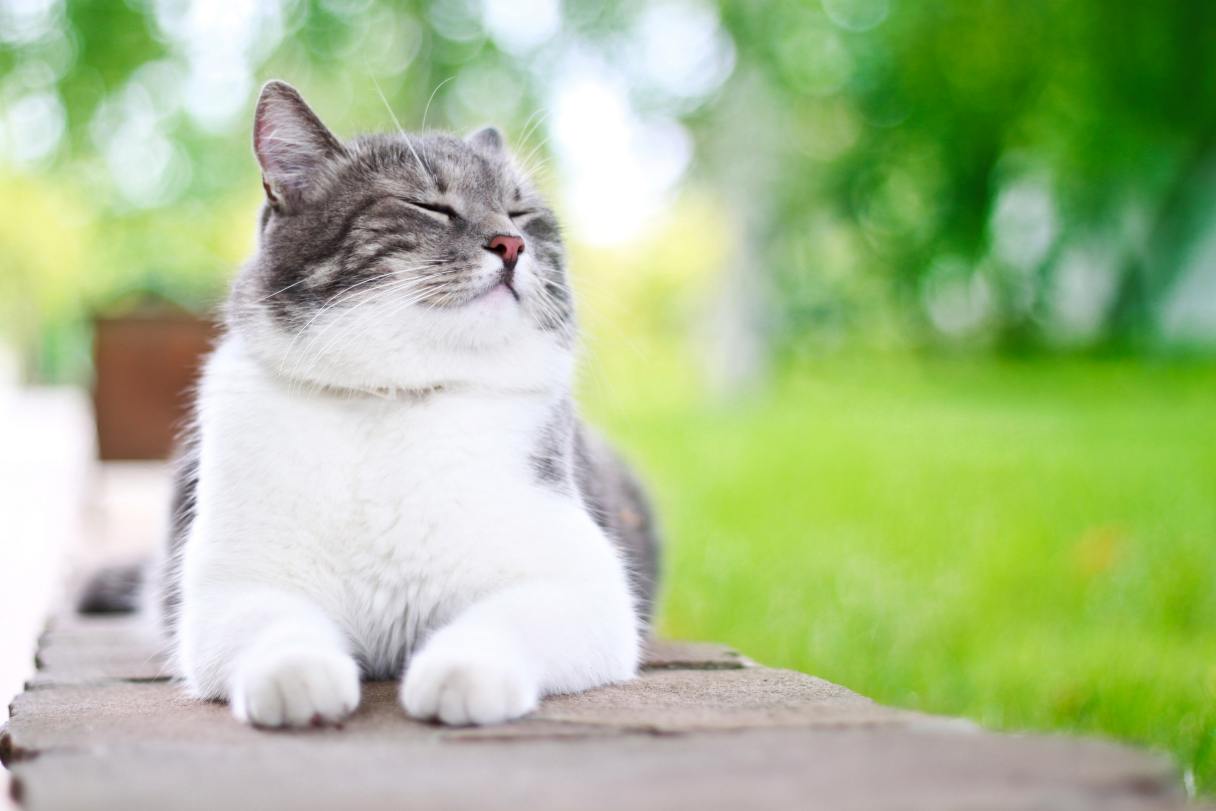An estimated 15% of all cats are impacted by heart disease, but detecting it can be difficult.1 Here’s what you need to know about cat heart disease to determine if your cat needs a heart check and how you can help prevent it.
What Is Cat Heart Disease?
Heart disease in cats is a serious condition involving the structure of the heart that adversely affects its ability to function properly. Generally speaking, there are two kinds of cat heart disease:
- Congenital. Congenital heart disease is caused by a birth defect involving the formation of the heart. This may be a hereditary condition or caused by issues affecting the development of the fetus. Congenital heart disease is present from birth, although symptoms may not appear until adolescence or adulthood.
- Adult-onset. Adult-onset heart disease is caused by damage to the heart sustained later in life. This can also be the result of a hereditary condition that develops as the cat ages, although lifestyle can also be a factor.
Prevalence of Heart Disease in Cats
Heart disease is often seen less in cats than in dogs.2 But it affects an estimated 15% of cats worldwide.1 The most common type of heart disease in cats is hypertrophic cardiomyopathy (HCM), which primarily affects middle-aged male cats. Congenital heart disease is much rarer, found in only 1% to 2% of kittens.3
Certain purebred cats have a higher chance of developing heart disease. These include:2
- Maine coons. HCM is believed to impact about 33% of Maine coon cats. Severe cases may show up in kittens as young as 3 months old, while less severe cases may start showing signs around 2 to 4 years of age.
- American shorthair and British shorthair. Both of these breeds are predisposed to a less severe form of HCM.
- Persian. A high rate of HCM is also seen in Persian cats.
- Siamese. A type of congenital heart disease called patent ductus arteriosus (PDA) most commonly affects Siamese cats. This breed is also more predisposed to a type of adult-onset cardiomyopathy known as dilated cardiomyopathy.
Types of Cat Heart Disease
Here are some of the most common types of heart disease found in cats:
Dilated cardiomyopathy (DCM)
DCM occurs when the heart chambers enlarge, causing the walls of the heart to stretch too thin and become weakened. This makes the heart unable to efficiently pump blood out of it, which can result in fluid buildup in the chest cavity that prevents the lungs from fully expanding, causing shortness of breath — a condition known as congestive heart failure. DCM is believed to be caused by a taurine deficiency in the diet.
Hypertrophic cardiomyopathy (HCM)
HCM occurs when the muscle tissue of the left ventricle thickens, interfering with blood flow and causing the upper chambers of the heart to enlarge. This prevents the heart from being able to fully expand and fill with blood, which results in congestive heart failure. Blood clots can also form and lodge in arteries leading to the legs, causing lameness and pain.
HCM is the most commonly diagnosed form of heart disease in cats, found in 85% to 90% of cats with some form of heart abnormality.3
Restrictive cardiomyopathy (RCM)
Primarily affecting cats in their middle or senior years, RCM is caused by scar tissue that forms on the heart muscle, making it difficult for the heart to fill fully and pump blood through the body. Like HCM, this can also lead to congestive heart failure. It can also cause cats to develop arterial thromboembolisms (ATE), a life-threatening blood clotting disorder.4
Ventricular septal defect
This is the most common congenital heart condition in cats and is characterized by a hole in the heart present at birth. Some kittens born with this condition may never develop symptoms and will go on to live a long and healthy life. Those that do show symptoms may be able to have the defect corrected with surgery, or the condition may be managed with medication.4
Causes and Symptoms of Heart Disease in Cats
Veterinarians aren’t always sure exactly what causes cats to develop heart disease. Genetics and lifestyle are both believed to play a part, and some cardiomyopathies have been linked to nutritional deficiencies.
Underlying conditions — such as hypertension and hyperthyroidism, as well as heartworm — can cause damage to the heart that results in heart disease.
Heart disease can be hard to detect in cats because they’re so good at hiding their symptoms. Also, heart abnormalities that suggest a heart condition aren’t always easy to detect with a stethoscope, so they may get missed during routine veterinary exams. By the time a cat starts showing clear signs of heart disease, the condition is usually advanced.
These are some signs and symptoms of heart disease to watch for in cats:
- Difficulty breathing
- Rattling breath
- Fast or shallow breathing when at rest
- Chronic cough
- Lethargy
- Reluctance toward physical exertion
- Heart murmur
- Chronically increased heart rate
- Sudden back leg paralysis
- Fainting
- Collapse
Diagnosing Cat Heart Disease
The process of diagnosing heart disease in cats begins with a physical examination along with blood and urine tests for other possible health conditions that might explain your cat’s symptoms or exacerbate their condition. Your vet will use a stethoscope to listen for abnormalities in the heart and lungs. If any are detected, they may recommend the following additional tests:
- Chest X-ray. An X-ray can tell your vet whether the heart is enlarged and also whether there is fluid buildup in the chest cavity.
- Electrocardiogram. This will measure the heart’s electrical current to check for anomalies in your kitty’s heartbeat.
- Echocardiogram. This test uses ultrasound to look at heart function and measure the thickness of the walls of the heart muscle.
Progression and Prognosis
There are a few stages of cat heart disease that help determine the severity of the disease:
- Asymptomatic. Your vet may suspect the presence of heart disease, but your cat shows no outward signs and doesn’t appear to be affected by it.
- Mild to moderate. Signs indicate that your cat has developed congestive heart failure.
- Advanced. Symptoms have become critical, such as obvious respiratory distress, fainting and extreme fatigue or refusal to exercise.
Heart disease is a progressive illness, which means it will continue to get worse, not better. The prognosis depends largely on the stage of the illness and the severity of the symptoms. The possibility of arrhythmias that could cause cardiac arrest and sudden death complicates the ability of veterinarians to provide a specific prognosis.
Asymptomatic cats can live for years with heart disease before it begins to impact their health. Cats with heart failure who respond well to medications may live for months or even years before symptoms become life-threatening or quality of life deteriorates to a point where euthanasia is considered.
Treating Cats With Heart Disease
Some congenital heart defects may be corrected with surgery.2 Cardiomyopathies, however, are incurable. Treatment generally involves managing the symptoms of congestive heart failure, which is typically done via a combination of medications. These include:
- ACE inhibitors (most commonly benazepril or enalapril; however, the use of these is controversial — while benazepril is tolerated well in cats with heart disease, no evidence of benefit was detected)
- Beta-blockers (most commonly atenolol — helps with high blood pressure)
- Diuretics (furosemide or spironolactone)
- Inodilators (pimobendan)
- Calcium channel blockers (diltiazem or amlodipine — helps with arrhythmias)
These medications help the heart muscle relax, allowing it to fill with blood and pump more efficiently. This reduction in heart rate prevents the heart from working too hard. Diuretics also help to eliminate fluid from the chest cavity, making it easier for your cat to breathe.
Your vet may also recommend low-dose aspirin for your cat or prescribe a blood thinner (the most common is clopidogrel) to reduce the chance of complications from blood clots.
Cost of Treating Heart Disease in Cats
Here is a look at the average costs of medications commonly used to treat heart failure in cats. The actual costs will depend on factors such as dosage, amount, where you purchase the medication and whether you buy brand name or generic. Most of these medications are human medications (except pimobendan) and can be found at a local pharmacy.
| Medication | Brand names | Drug type | Average cost |
|---|---|---|---|
| Benazepril | Fortekor® | ACE inhibitor | $10+ |
| Enalapril | Enacard® | ACE inhibitor | $6+ |
| Clopidogrel | Plavix® | Anticoagulant | $4.50+ |
| Atenolol | Tenormin® | Beta-blocker | $10+ |
| Amlodipine | Istin® | Calcium channel blocker | $14+ |
| Diltiazem | Tiazac® | Calcium channel blocker | $12+ |
| Furosemide | Lasix®, Salix® | Diuretic | $14+ |
| Spironolactone | CaroSpir®, Aldactone® | Diuretic | $11+ |
| Pimobendan | Vetmedin® | Inodilator | $86+ |
Caring for a Cat With Heart Disease
Your vet will want to closely monitor your cat’s condition, which means veterinary checkups at least every six months. They’ll show you how to monitor your cat at home between vet visits, which will include tracking their respiratory rate and vital signs. You’ll need to report any changes in their condition to your vet. As the disease progresses, your cat may experience episodes of respiratory distress that require emergency hospitalization so they can receive oxygen therapy.
Generally, veterinarians don’t recommend a special diet for cats with heart disease, although a low-sodium diet may be recommended for cats with high blood pressure. It’s essential that cats with heart disease receive enough taurine in their diet and maintain a healthy weight. You should discuss your cat’s diet with your vet to see if you need to make any adjustments. If your cat is overweight, your vet may recommend a special food for weight loss.2
Based on your cat’s specific needs, your vet might also recommend giving your cat vitamin E or coenzyme Q10 to help improve heart function.2
It’s essential to reduce your cat’s stress as much as possible and keep them from overexerting themselves. Here are some things that might help:
- Provide them with a quiet place to rest and sleep.
- Keep their litter box, food dish and water bowl close to their bed and all on the same floor of the house.
- Offer different types of food if their appetite becomes picky, and make sure they are eating something.
- Keep their litter box clean.
- Freshen their water regularly.
- Don’t try to force them to play or exercise, and keep them from overdoing it when they feel playful.
- If you have other pets, prevent fights from breaking out and separate pets that cause your cat stress.
- If you have small children, you may need to restrict their access and prevent them from being too boisterous around your cat.
- Shower your cat with love and affection when they feel well enough to receive it, and give them space when they don’t.
- Talk to your vet about your cat’s quality of life, and think about a plan to provide a peaceful exit when their condition worsens.
Heart Disease Prevention in Cats
Regular veterinary checkups on an age-appropriate schedule are one of the best things you can do for your cat. This can both help prevent your cat from developing heart disease and catch it early enough to improve outcomes if a heart issue does develop.
Keeping your cat at a healthy weight can also help, which means helping them get regular exercise and being careful not to overfeed them. It’s also important that they eat a diet rich in taurine and other amino acids. A high-quality, meat-based cat food that doesn’t use grains or other carbs for fillers is generally best. If your cat is overweight, you should ask your vet for advice on helping them trim down.5
CareCredit Credit Card Financing for Cats
The CareCredit credit card is an easy way to pay for your cat’s annual checkups, food and products at veterinary practices in the CareCredit network.* Use our Acceptance Locator to find a veterinarian near you that accepts CareCredit to help keep your pet healthy and happy for a lifetime of love. CareCredit is there for you and your pet every step of the way; continue your wellness journey by downloading the CareCredit Mobile App to manage your account, find a provider on the go and easily access the Well U blog for more great articles, podcasts and videos.
In addition to pet care, you can also use your CareCredit credit card for dentistry, cosmetic, vision, hearing, health systems, dermatology, pharmacy purchases, spa treatments and so much more within the CareCredit network. How will you invest in your health and wellness next?
Expert Reviewer
Dr. Kathy Wiederkehr (Wentworth), V.M.D.
Dr. Kathy Wiederkehr (Wentworth) has been practicing veterinary medicine at pet care facilities in California since 2001. Most recently, she served as medical director of the VCA PetPoint Medical Center and Resort in Irvine. She is a graduate of the University of Pennsylvania School of Veterinary Medicine and became board-certified as a diplomate in Canine and Feline Practice by the American Board of Veterinary Practitioners in 2010.
Author Bio
Jean Marie Bauhaus is a freelance writer and novelist who has been writing pet content since 2013. Her work has appeared on Forbes.com, Hill's Pet, Chewy, AKC.org and more.








